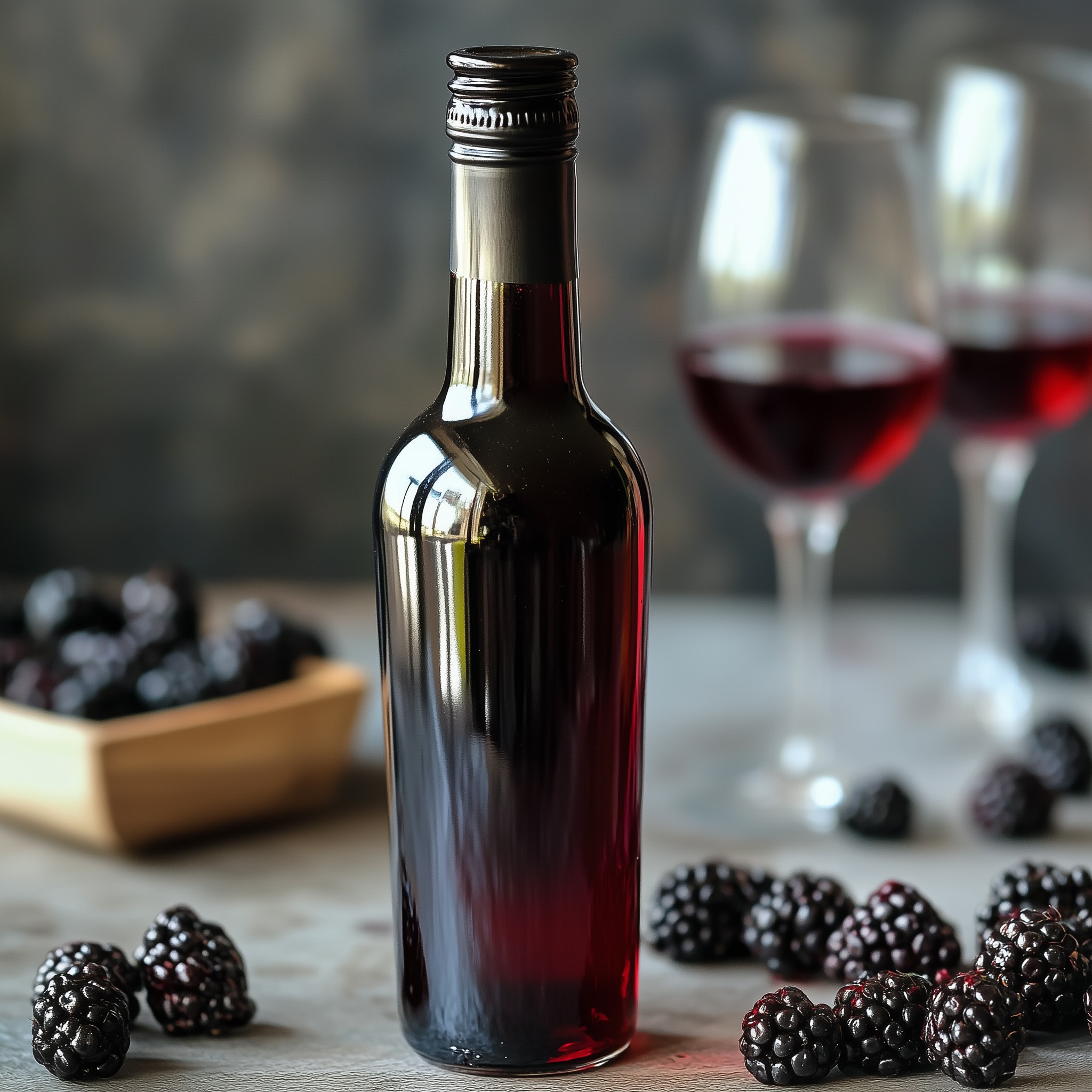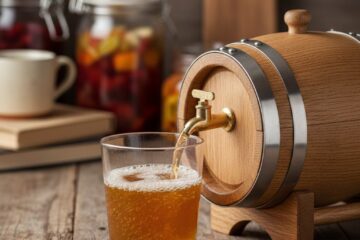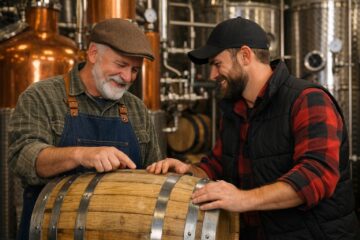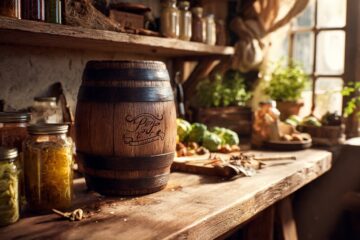Oak-Aged Homemade Blackberry Wine
Equipment
- - 1-gallon glass carboy
- - Airlock and stopper
- - Large mesh straining bag
- - Large pot
- - Hydrometer
- - Siphon and tubing
- - Wine bottles and corks
Ingredients
- 6 lbs fresh blackberries
- 2.5 lbs granulated sugar
- 1 packet wine yeast Lalvin 71B-1122
- 1 tsp yeast nutrient
- 1 Campden tablet crushed
- Water to 1 gallon
- 1 BarrelsWood 5L oak cask for aging
Instructions
- Prepare the Fruit
- Wash blackberries thoroughly.
- Place berries in the mesh bag and lightly crush to release juices.
- Make the Must
- In a large pot, dissolve sugar in 1/2 gallon of warm water.
- Add the crushed blackberries in the mesh bag.
- Top up with water to reach 1 gallon.
- Add yeast nutrient and crushed Campden tablet.
- Cover and let sit for 24 hours.
- Start Fermentation
- Remove the Campden tablet.
- Sprinkle yeast over the surface.
- Cover and let ferment for 5-7 days, stirring daily.
- Secondary Fermentation
- Remove fruit bag, squeezing gently to extract juice.
- Siphon liquid into sanitized carboy.
- Attach airlock and let ferment for 4-6 weeks.
- Oak Aging
- Prepare your BarrelsWood 5L oak cask according to instructions.
- Siphon wine into the oak cask.
- Age for 6-12 months, tasting periodically to achieve desired oak flavor.
- Bottle the Wine
- Siphon wine from oak cask into sanitized bottles.
- Cork bottles and store upright for 3 days.
- Age in bottles for an additional 3-6 months before drinking.
Notes
Sanitize all equipment thoroughly before use.
Keep fermentation temperature between 70-75°F (21-24°C).
The BarrelsWood oak cask will impart flavors more quickly than larger barrels. Taste regularly to avoid over-oaking.
Nutrition
Calories: 160 per 5 oz serving
Carbohydrates: 5g
Alcohol: 12-14% ABV
The Art of Crafting Blackberry Wine: A Summer Tradition
As the late summer sun warms plump blackberries to perfection, wine enthusiasts and home brewers alike turn their attention to a time-honored tradition: crafting homemade blackberry wine. This deep purple elixir captures the essence of summer in a bottle, offering a delightful blend of sweet and tart flavors that mature into a complex, full-bodied wine.
From Bramble to Bottle
The journey from bramble to bottle begins with the harvest. Whether you’re foraging wild blackberries or cultivating your own, the key is to select ripe, juicy berries at their peak. This typically occurs in late August to early September, when the berries are plump and easily detach from the bush.
Once gathered, the berries are crushed to release their juices, a process that can be both therapeutic and messy. The resulting must – a mixture of juice, pulp, and skins – forms the base of your wine. This is where the magic begins, as yeast transforms the natural sugars into alcohol over several weeks of fermentation.
The Alchemy of Fermentation
Blackberry wine fermentation is a delicate balance of science and art. While the basic process is straightforward, subtle variations in ingredients and technique can significantly impact the final product. Many home winemakers add sugar to boost alcohol content and balance acidity, while others incorporate additional ingredients like acid blend or tannin powder to enhance flavor complexity.
The choice of yeast is crucial, with many opting for strains like Lalvin EC-1118, known for its ability to ferment fruit wines efficiently. As fermentation progresses, the wine undergoes several rackings – transfers from one container to another – to separate the liquid from sediment and clarify the wine.
Patience: The Secret Ingredient
Perhaps the most challenging aspect of making blackberry wine is the wait. Unlike some quick-fermenting beverages, a truly exceptional blackberry wine requires time to develop its full character. Most recipes recommend aging for at least 6-12 months, with some enthusiasts waiting up to 18 months before uncorking their creation.
This patience is rewarded with a wine that boasts a deep, rich color and a complex flavor profile. Notes of ripe blackberry are complemented by subtle hints of oak (if barrel-aged) and a pleasant tannic structure that develops over time.
A Versatile Vintage
Homemade blackberry wine is more than just a beverage; it’s a versatile ingredient in the kitchen. Its robust flavor pairs wonderfully with dark chocolate desserts, enhances meat glazes, and adds depth to savory sauces. Some creative cooks even use it as a base for unique cocktails or sangrias.
Continuing the Tradition
As each season brings a new crop of blackberries, home winemakers continue to refine their craft, experimenting with different techniques and ingredients. Some are embracing modern technology, using precise temperature control and specialized yeasts, while others prefer traditional methods passed down through generations.
Regardless of the approach, the art of making blackberry wine remains a cherished summer tradition. It’s a practice that connects us to the land, to the changing seasons, and to the timeless pleasure of transforming nature’s bounty into something truly special.
So the next time you spot a bramble heavy with ripe blackberries, consider trying your hand at this ancient craft. With a bit of patience and care, you might just bottle a taste of summer to enjoy all year round.




